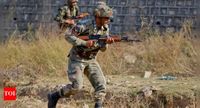In a significant military operation early Wednesday, May 7, 2025, India launched "Operation Sindoor," targeting nine terrorist bases in Pakistan and Pakistan-occupied Kashmir (PoK). This tri-services operation, executed by the Indian Army, Navy, and Air Force, was carried out from Indian territory and aimed at dismantling terror infrastructure linked to groups responsible for recent attacks in India.
The strikes were a direct response to the brutal terror attack in Pahalgam on April 22, which claimed the lives of 26 civilians. This tragic incident prompted Indian officials to reaffirm their commitment to holding those responsible accountable. As stated by a government spokesperson, "We are living up to the commitment that those responsible for this attack will be held accountable." The operation specifically targeted the headquarters of Jaish-e-Mohammed (JeM) in Bahawalpur and Lashkar-e-Taiba (LeT) in Muridke, both of which have long been implicated in orchestrating attacks against India.
According to a statement from the Indian Ministry of Defence, the operation was characterized as "focused, measured, and non-escalatory," explicitly avoiding any Pakistani military installations. The intent was to strike at the leadership of these terror groups without escalating tensions further. The ministry confirmed that four of the nine targets were located within Pakistan, while five were situated in PoK.
Details of the operation revealed that intelligence agencies provided precise coordinates for the strikes, ensuring that the locations selected were critical to the operational capabilities of JeM and LeT. This careful planning aimed to neutralize key figures within these organizations who were believed to be masterminding cross-border terror activities.
In the aftermath of the strikes, Pakistan reacted by placing its air force on high alert and warning that it would respond at a time and place of its choosing. A statement from the Pakistani military indicated that they were prepared to defend their airspace and retaliate against any aggression. The situation has led to increased military activity along the Line of Control (LoC), with reports of heavy mortar shelling by the Pakistani army on forward villages in Poonch and Rajouri.
As tensions escalated, air travel in northern India faced significant disruptions. The Airports Authority of India confirmed that the Srinagar airfield was closed, with no commercial flights operating from there on the day of the strikes. Major airlines, including IndiGo and SpiceJet, issued advisories to travelers in affected cities such as Jammu, Amritsar, and Leh, urging them to check flight statuses before heading to the airport.
International carriers were also impacted, with Qatar Airways announcing the temporary suspension of flights to Pakistan due to the closure of Pakistani airspace. The airline is closely monitoring the situation and prioritizing the safety of its passengers and crew.
In response to the heightened military activity, a Notice to Airmen (NOTAM) was issued over Rajasthan, warning of a restricted military zone due to ongoing exercises by the Indian Army, which included validation drills with main battle tanks and special heliborne operations. The Indian Navy also conducted long-range missile firings in the Arabian Sea, while the Air Force engaged in Exercise Akraman, simulating precision ground attacks.
Following the operation, India took the initiative to brief several world capitals about its actions against terrorism. National Security Advisor (NSA) Ajit Doval engaged with his U.S. counterpart, NSA Marco Rubio, providing details of the operation and the reasons behind it. The Indian embassy in Washington emphasized that there was credible evidence linking Pakistan-based terrorists to the Pahalgam attack, stating, "India has credible leads, technical inputs, testimony of the survivors, and other evidence pointing towards the clear involvement of Pakistan-based terrorists in this attack."
Despite India's efforts to communicate its position, the response from Pakistan has been one of denial and accusations of false flag operations. Following the strikes, the United Nations Security Council convened for closed-door consultations to discuss the rising tensions, although no formal statement was issued afterward.
As the situation continues to develop, the Indian government has indicated that it will remain vigilant and prepared to respond to any threats. Union Home Secretary Govind Mohan announced plans to review civil defense mechanisms, including conducting mock drills and training civilians to protect themselves in the event of a hostile attack.
With both nations on high alert, the international community watches closely, hoping for a de-escalation of tensions. U.S. President Donald Trump expressed concern over the situation, urging both sides to seek a peaceful resolution, while acknowledging the longstanding history of conflict between India and Pakistan.
As Operation Sindoor unfolds, the implications for regional stability remain uncertain. The targeted strikes represent a significant escalation in India's military posture, reflecting its determination to combat terrorism while navigating the complex geopolitical landscape of South Asia.


